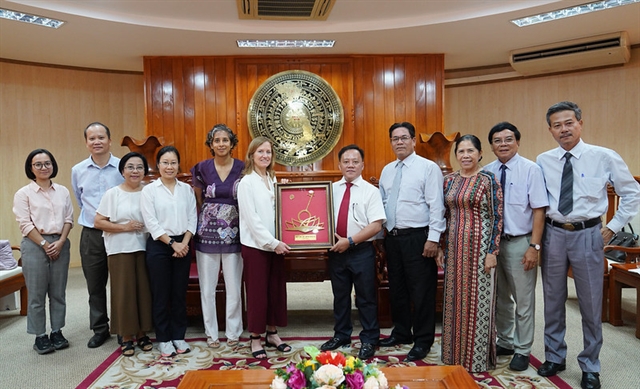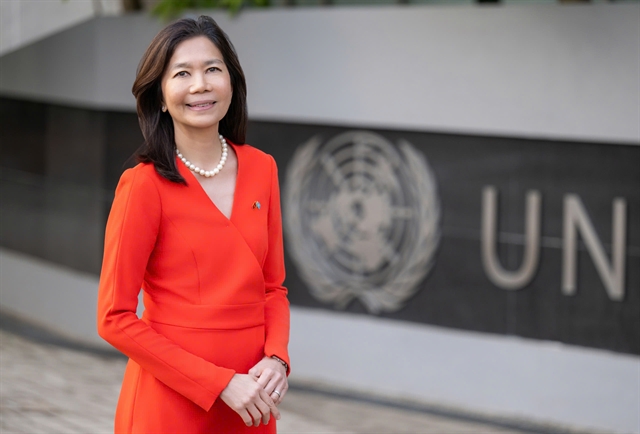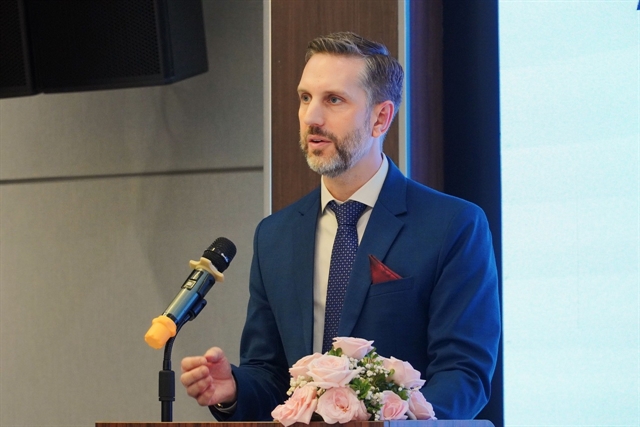 Society
Society

 |
| Pauline Tamesis, UN Resident Coordinator in Việt Nam. Photos Courtesy of the UN |
By Pauline Tamesis and Matt Jackson
Huỳnh Hữu Cảnh from Kiên Giang Province, Việt Nam lost his eyesight in an unexploded ordnance accident when he was just 8 years old. Despite this significant challenge, Cảnh has shown remarkable resilience and determination, overcoming discrimination and barriers to achieve his goals.
After the accident, Cảnh pursued his education at the An Giang School for Children with Disabilities and later at the Nguyễn Đình Chiểu Specialised High School for children with visual impairments in Hồ Chí Minh City. He excelled academically and went on to study at the HCM City University of Education where he participated in sports, social welfare programmes, and scientific research.
Committed to overcoming the barriers he and others living with disabilities faced, he developed a walking stick with LED lights and different sounds to help visually impaired individuals navigate their surroundings safely. This invention won first prize at a scientific research contest and was honoured at the Creative Youth Festival hosted by the Việt Nam Youth Union. Cảnh currently works at the Kiên Giang province's Social Welfare Centre where he teaches Braille to children with visual impairments and gives piano lessons to children with disabilities. His story is a testament to the impact one individual can have on their community. Yet Canh’s story is just one of many inspiring stories about young people with disabilities.
 |
| Matt Jackson, UNFPA Representative in Việt Nam. |
3rd December is the annual International Day of Persons with Disabilities, a day dedicated to raising awareness and promoting the rights and well-being of individuals with disabilities. As we approach this significant day, we reflect on our collective responsibility to foster inclusivity and equality for all members of society, particularly young people with disabilities.
Globally, over 1 billion people, or 16 per cent of the world's population, experience some form of disability, a number that continues to rise due to factors like population ageing and the increase in non-communicable diseases. In Việt Nam, 7 per cent of the population (7 million individuals) live with a disability. These statistics are more than numbers, they are people’s lives, yet they underscore the importance of recognising and addressing the inequalities and challenges faced by persons with disabilities.
Today is a powerful reminder of the need to dismantle societal barriers and challenge the stigmas often associated with disabilities. This year's theme, "Amplifying the Leadership of Persons with Disabilities for an Inclusive and Sustainable Future," emphasises the critical role that individuals with disabilities, especially youth, play in society's development. Their leadership skills and community engagement are instrumental in changing negative perceptions and showcasing their abilities.
Youth with disabilities are making significant strides by starting social enterprises, holding important positions in organisations and companies, and influencing positive change. By acknowledging their achievements and potential we promote equal opportunities in education, employment, and all aspects of life, ensuring that young people with disabilities have the same chances to thrive as their peers.
The UN Country Team in Việt Nam collaborates to amplify the voices of persons with disabilities (PWD), enhance their well-being and ensure that they are not left behind in the country’s journey to be a high-income country.
UNFPA, the United Nations sexual and reproductive health agency is dedicated to delivering a world where every pregnancy is wanted, every childbirth is safe, and every young person's potential is fulfilled. A critical aspect of this mandate is the promotion of Comprehensive Sexuality Education (CSE) which plays a central role in preparing young people for a safe, productive, fulfilling life in a world where inequalities based on gender and sexual orientation still pose serious risks to their well-being.
CSE gives young people, including those with disabilities, the tools they need to have healthy lives and relationships. It helps them to understand life-changing decisions about their body and equips them with the ability to navigate relationships, understand consent and protect themselves from sexually transmitted infections (STIs) and unintended pregnancies. By integrating CSE into educational curricula and community programmes, UNFPA helps ensure that all young people, regardless of their abilities, have access to essential sexual and reproductive health (SRH) information and services. UNESCO also uniquely contributes to CSE through policy development and capacity building. Focusing on education, UNESCO ensures young people receive accurate and age-appropriate information about sexual and reproductive health, fostering long-term positive changes in attitudes and behaviours.
A UNDP, UNFPA and UNICEF joint programme further expands access to Inclusive Education Resource Centers (IERCs), distributes Accessible Learning Materials (ALMs), mainstreams disability content in CSE and develops national guidelines for health providers on SRH services for persons with disabilities. In addition, UNICEF runs specialised training programmes for frontline workers on disability inclusion equipping healthcare providers, educators and social workers with approaches that ensure access to essential services tailored to persons with disabilities. These coordinated efforts aim to embed sustainable, inclusive practices that uphold the rights and well-being of persons with disabilities.
To celebrate this year’s International Day of People with Disability, the UN’s Photovoice Contest draws powerful stories from around the country, highlighting diverse experiences and aspirations for inclusive education. Young people with disabilities and their allies shared photos and stories, capturing moments that reflect both challenges and triumphs. Through vivid photographs and deeply personal narratives, participants shed light on the barriers they face, such as inaccessible schools and social stigma, as well as the empowerment that comes from inclusive educational practices.
One submission featured a single mother named Hiền with leg impairments. To be a role model for her daughter she is pursuing lifelong learning, improving herself and attending workshops to hone her different skills.
Cảnh and Hiền's journeys, along with the experiences of other role models in the PWD community, remind us that with determination, creativity and the will to help others, we can overcome obstacles and inspire those around us.
The UN and partners use these stories not only to celebrate inclusivity but also to learn from the lived experiences of young people. The firsthand accounts guide UN agencies as they provide support to policy development and implement initiatives that support accessible and inclusive education worldwide. By amplifying these voices, the UN demonstrates its commitment to fostering environments where all young people can lead, learn and thrive.
By providing a deeper understanding of the realities faced by persons with disabilities and fostering greater respect and appreciation for their contributions, we can create a more inclusive and equitable society. As we celebrate the International Day of Persons with Disabilities, let us renew our commitment to inclusivity and equality. Let us work together to create a future where diversity is embraced and every individual, regardless of ability, can thrive.
*Pauline Tamesis is the UN Resident Coordinator in Việt Nam and Matt Jackson is the UNFPA Representative in Việt Nam